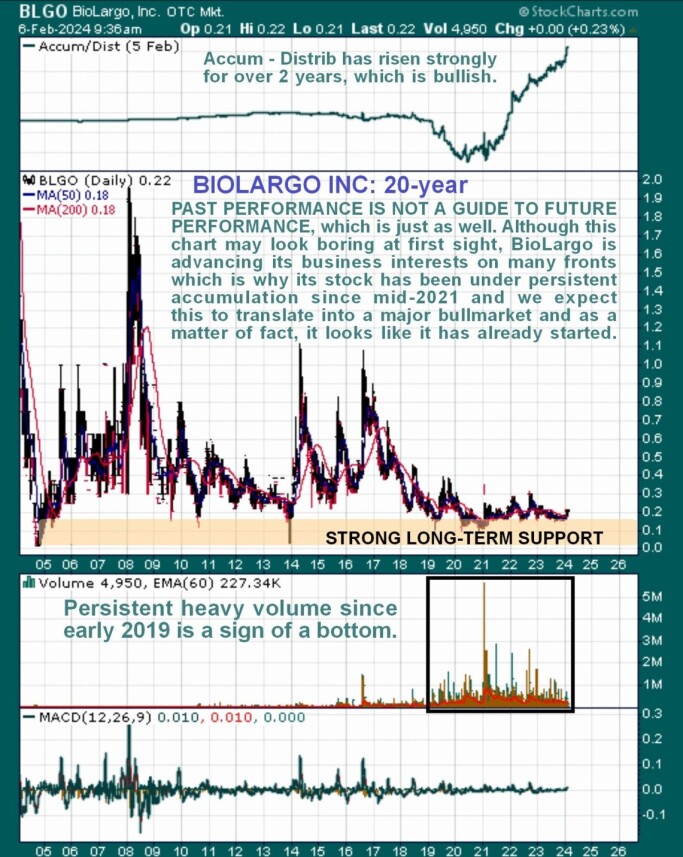Clean tech company BioLargo Inc. (BLGO:OTCQB) announced that a retired U.S. Environmental Protection Agency senior executive has joined the Board of Directors of its new subsidiary targeting so-called "forever chemicals" that affect as much as 60% of the U.S. population.
Sally Gutierrez has held the title of director for numerous offices within EPA's Office of Research and Development, including the Environmental Technology Innovation Cluster Development and Support Program, the National Risk Management Research Laboratory (NRMRL), and the NRMRL Water Supply and Water Resources Division. She also served as a senior water advisor for ORD's Center for Environmental Solutions and Emergency Response and the acting director of the Water Permits Division within the EPA's Office of Wastewater Management, BioLargo noted.
Gutierrez said she was drawn to the BioLargo subsidiary, BioLargo Equipment Solutions and Technologies Inc., by its innovative treatment solutions for removing per- and polyfluoroalkyl substances (PFAS) from contaminated water.
"Of all the environmental challenges I have tackled in my career, PFAS contamination is one of the most serious public health issues," Gutierrez said. "BioLargo's AEC technology stands apart as a solution that offers an effective alternative to more traditional technologies for management of PFAS, especially in regard to waste generation."
"My goal is to help BioLargo bring its PFAS treatment solution to communities across the country and make sure that every American city and town has access to safe drinking water," Gutierrez continued.
The Catalyst: Nearly Half of US Tap Water Affected
According to new testing from the Environmental Protection Agency, about 70 million people are exposed to the substances in U.S. drinking water. But that testing has only checked about one-third of the nation's public water systems.
The agency said it is on pace to find over 200 million people exposed, or at least 60% of Americans. The figure does not include private wells used by an estimated 8 million people.
PFAS are a group of thousands of synthetic chemicals used in everything from the linings of fast-food boxes and non-stick cookware to fire-fighting foams and other purposes. The survey said high concentrations of some PFAS may lead to adverse health risks in people, although research is still being conducted.
The Environmental Protection Agency said it is on pace to find over 200 million people exposed, or at least 60% of Americans.
They are called "forever chemicals" because they break down very slowly, the USGS noted.
The study found most PFAS exposure near urban areas and potential PFAS sources, including the Great Plains, Great Lakes, Eastern Seaboard, and Central/Southern California regions.
"USGS scientists tested water collected directly from people's kitchen sinks across the nation, providing the most comprehensive study to date on PFAS in tap water from both private wells and public supplies,” said USGS research hydrologist Kelly Smalling, the study's lead author. "The study estimates that at least one type of PFAS – of those that were monitored – could be present in nearly half of the tap water in the U.S. Furthermore, PFAS concentrations were similar between public supplies and private wells."
You can explore a map of PFAS detections across the country on the Environmental Working Group website to see if you may be affected. The group said there is contaminated drinking water in all 50 states, the District of Columbia, and two territories.
Report: Chemicals Costing Global Economy Trillions
Found in thousands of products, from food packaging to clothing to toilet paper, PFAS can lead to increased risk of cancer, developmental delays in children, hormonal disruption, high cholesterol, and reduced immune system effectiveness, the EPA said.
A new research paper found diets rich in foods like processed meat and butter likely increase levels of PFAS in human blood over time.
A range of foods are among the causes, the study said, including teas, pork, candy, sports drinks, processed meat, butter, chips and bottled water. The research also pointed to higher PFAS blood levels among those who consumed more carryout or food prepared at restaurants.
More than 15,000 claims have been filed nationwide against DuPont and its spinoffs and 3M, major manufacturers of the substances in the U.S., Time reported. So far, settlements have totaled nearly US$11.5 billion in damages. But that amount could grow to even exceed "the more than (US)$200 billion paid by Big Tobacco in the 1990s," Time noted.
"BioLargo is a solid long-term investment with a lot more upside than many might expect," Technical Analyst Clive Maund wrote.
"Not 100% of Americans are walking around smoking tobacco," Erik Olson, senior strategic director for the Natural Resources Defense Council, told Time. "But basically 100% of Americans are walking around with PFAS in their bodies, and none of them asked for that."
The cost to society of using PFAS across the global economy is as high as US$17.5 trillion a year, according to a recent report compiled by Swedish non-governmental organization ChemSec. The same study found that profits for the world's largest PFAS manufacturers totaled just US$4 billion annually.
BioLargo's Aqueous Electrostatic Concentrator (AEC) technology separates PFAS compounds in an electrostatic field, forcing them to flow across a proprietary membrane system. The company said it removes more than 99% of the PFAS from water at energy costs as low as 30 cents per 1,000 gallons.
Its waste stream is a fraction of that of traditional carbon or ion exchange systems, and the company combines the AEC system with a turnkey collection, membrane exchange, and disposal service. The system is modular, portable, and scalable.
Testing has shown the technology removes the chemicals to a level of "non-detection," or a level at which science can no longer detect them, the company said.
Company 'Growing Rapidly'
 The company recently launched its subsidiary BioLargo Equipment Solutions and Technologies BEST to capitalize on its PFAS treatment technologies.
The company recently launched its subsidiary BioLargo Equipment Solutions and Technologies BEST to capitalize on its PFAS treatment technologies.
In addition to Gutierrez, joining the company's board is Larry Dick, a member of the board of directors of the Municipal Water District of Orange County, California (MWDOC) and former Vice Chairman of the board of the Metropolitan Water District of Southern California (MWDSC).
Parent company BioLargo is also finding success with Pooph, a pet odor control product line featuring safe and eco-friendly products being sold through retailers like Amazon, Walmart, and Chewy.
Other BioLargo subsidiaries include ONM Environmental (which spawned Pooph), BioLargo Engineering, BioLargo Water, BioLargo Energy Technologies, and Clyra Medical Technologies.
On February 7, Technical Analyst Clive Maund said the company's revenues are "growing rapidly as sales accelerate dramatically."
"The key point for investors to grasp is that these subsidiaries of BioLargo represent years of developmental work and investment by the company that is now being brought to fruition with market-ready products and services that are being rolled out and gaining widespread acclaim and uptake," Maund wrote.
Reading the long-term chart (on the left), he said the price could go as high as CA$1 or CA$1.10 over one or two years because of the rapid growth prospects of the company's businesses.
"The conclusion is that BioLargo is a solid long-term investment with a lot more upside than many might expect, and if, as suspected, it is indeed marking out a bull Flag, then it is even a Buy for shorter-term traders whilst it remains within the confines of the Flag," Maund wrote.
Ownership and Share Structure
About 14.6% of BioLargo is owned by insiders and management, according to Yahoo Finance. They include Chief Science Officer Kenneth Code with 8.67%, CEO Calvert with 3.41%, and Director Jack Strommen with 1.5%, Reuters reported.
About 0.04% is held by the institution First American Trust, Reuters said.
The rest, about 85%, is retail.
Its market cap is US$80.34 million, with about 289.5 million shares outstanding and about 248 million free-floating. It trades in a 52-week range of US$0.2989 and US$0.15.
| Want to be the first to know about interesting Technology investment ideas? Sign up to receive the FREE Streetwise Reports' newsletter. | Subscribe |
Important Disclosures:
- BioLargo Inc is a billboard sponsor of Streetwise Reports and pays SWR a monthly sponsorship fee between US$4,000 and US$5,000.
- As of the date of this article, officers and/or employees of Streetwise Reports LLC (including members of their household) own securities of BioLargo Inc.
- Steve Sobek wrote this article for Streetwise Reports LLC and provides services to Streetwise Reports as an employee. They or members of their household own securities of: [COMPANY]. They or members of their household are paid by: [COMPANY]
- This article does not constitute investment advice and is not a solicitation for any investment. Streetwise Reports does not render general or specific investment advice and the information on Streetwise Reports should not be considered a recommendation to buy or sell any security. Each reader is encouraged to consult with his or her personal financial adviser and perform their own comprehensive investment research. By opening this page, each reader accepts and agrees to Streetwise Reports' terms of use and full legal disclaimer. Streetwise Reports does not endorse or recommend the business, products, services or securities of any company.
- This article does not constitute medical advice. Officers, employees and contributors to Streetwise Reports are not licensed medical professionals. Readers should always contact their healthcare professionals for medical advice.
For additional disclosures, please click here.





































